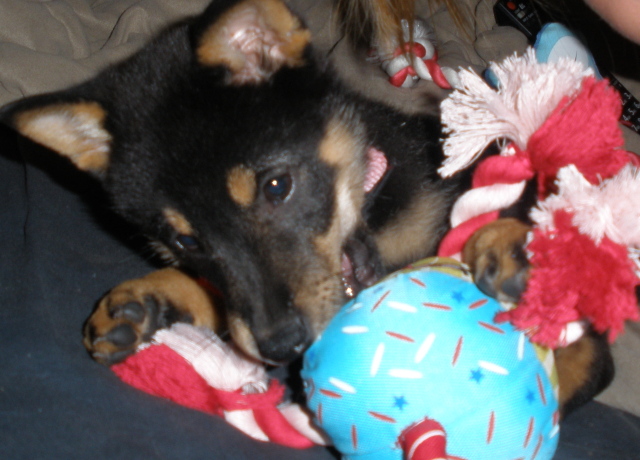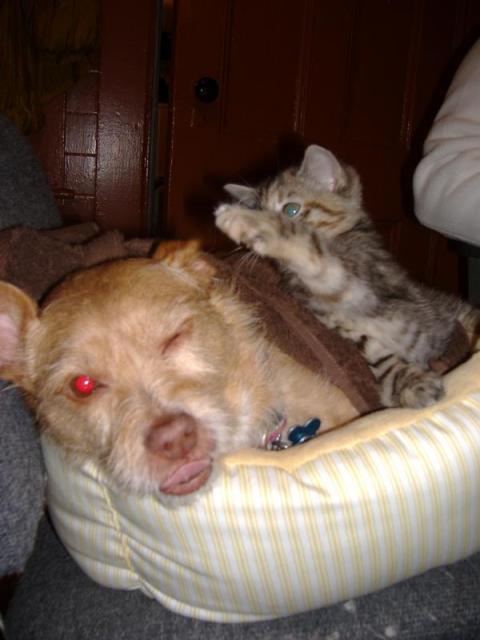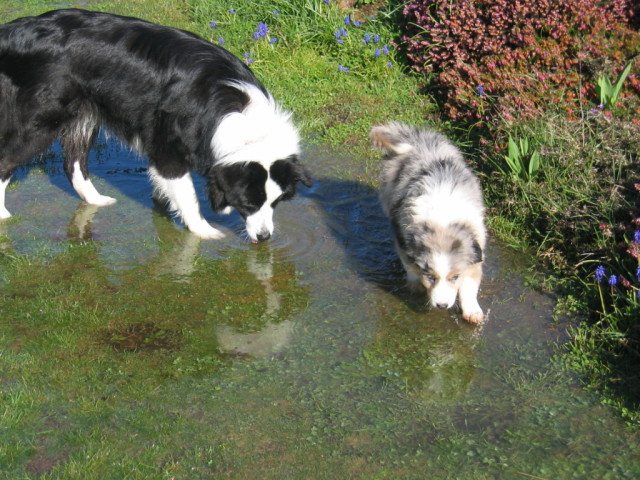QuestionQUESTION:
First of all, I am an expert on this site in the orthopedic board so I do appreciate your time.
We got our dog Chaya at the pound when she was 9 months old. She was extremely skittish, passive and afraid of her surroundings and of people. She was set to be put down becuase she was so skittish. Needless to say, she needed us.
We have had her for 9 years and we love her very much. She has never been comfortable around other dogs, she was afraid, but never showed any aggressive behavior. We worked with her and she got to love walks, and loved chasing balls, frisbees, and playing tug of war. She became a wonderful pet and has been loving and attentive. Never gave us a day of a problem. We had people come in and out of the house for all of her nine years and she barked but never showed aggression.
I forgot to say that she is a border collie/lab mix. She's nine years old now and weighs about 75 pounds. Her hind legs have a slight case of arthitis, but the vet said it's not a bad case.
About one year ago, she stopped wanting to go on walks. She got excited when she saw the leash, and ran out the door with my husband or son and she would get to the end of the driveway and run back to the house. Sometimes we'd get her to walk a block or so and then she'd run back to the house. My husband started to put her in the car, just so she'd get some air outside the house. She would just go out to urinate in the backyard and that would be it.
After she stopped walking, if we would have friends over, she would bark like crazy when they came in (which was normal), and then she'd smell them and be fine and gentle. Lately she has been more aggressive when people come in and at times has snapped at people. She never bites, but growls and snaps. We had a friend come over yesterday and she growled at their son who is 4 years old.
She tends to show aggression towards females and children. We took her to the vet today and she shows no agreesion at all to the vet, in fact she cowered in the corner. There are no physical problems present other than she is a bit oveweight, and slight arthritis in the knees, according to the vet.
His suggestion was to put her away when guests come to visit. I hate to do that because we see her as a gentle dog, but my husband and I are afraid that she might "turn" on a guest, especially a child so we are going to put her in a room if we have company.
I know that will upset her because she loves to be with us, even if she just lies on the floor. She gets anxious when she sees we are trying to remover her from near us and won't go into a room. She shows this anxiousness even if we don't have company and we just want to remove her to another room. It's almost as if she "knows" that she is going to be removed for some reason.
But it's the agreesion that concerns us. The vet will do a behavior consult for over $200 but I wanted to start on all experts before we consented to that.
Thank you
Sharon
ANSWER: First, I don't know what Vet will do a behavior consult unless s/he is specially trained in it. I don't trust that. Forget it.
Second, your dog appears to be showing signs of cognitive dysfunction and the aggression you are describing is plainly FEAR based. It's never a good idea to allow any adult dog to interact with anyone's young children, no matter how friendly the dog or how many of your own children the dog has successfully lived with. Children are unpredictable, dogs respond with "discipline" which can (and often does, given the statistics) result in a nip (usually to the child's face.) Never, for any reason, have I allowed any of my dogs to interact with my daughter's friends throughout her childhood. I have chosen to protect the dog. I suggest you do the same.
The fact that she shows no aggression at the vet (but cowers in the corner) is a clear sign of her exaggerated submission and fear. Her so-called aggression is absolutely fear driven; she may have developing cataracts or hearing loss (I don't know whether or not the Vet addressed this). She certainly DOES have cognitive dysfunction (as shown by her change in behavior toward the car and on walks) which appears to be worsening. Old age in dogs carries with it a very sad (and sometimes heartbreaking) disintegration of persistent behaviors, and this includes greeting visitors, car rides, reaction to things the dog normally would have welcomed but is suddenly fearful of, eating behaviors, house training issues, sudden fear of things in the home -- benign things like furniture -- personality changes (my 16 year old Whippet with a CDX and a CGC snarled at my young adult daughter last winter when she walked into the room suddenly). This may be senile dementia or it may be the result of small strokes or any number of physiological things. It can't be 'cured' but it can be assisted. For nutritional and holistic assistance in diminishing cognitive function I suggest you ask Shelly Davis (a member of this forum) who seems to know a great deal about nutritional supplements.
In terms of allowing your dog to interact with your visitors, the answer is: NO. Your dog does not need to be isolated, however; she needs a house restraint (lightweight cotton training leash, up to 16 feet in length). Your visitors need to be STRONGLY and FIRMLY directed to NOT INTERACT with the dog for any reason. The dog can lie beside your chair, follow you (on restraint) if you leave the room, etc. but she is firmly not allowed to interact with your visitors FOR ANY REASON. She will not feel isolated (isolation can cause tremendous anxiety in dogs suffering cognitive dysfunction) but she will not have the opportunity to bite. Actually, contrary to human emotional response, your visitors' ignoring her might be ultimately comforting, since this is a clear sign to her of low rank in the situation. She may bark, she may complain, but ultimately this is the kindest route. Regarding children, absolutely NO INTERACTION with children. If she bites (and she may), you'll be sued and you'll have animal control at your door with a court order to drag your beloved dog to the nearest municipal kill shelter. DON'T DO IT. if you must entertain children in your home, despite her anxiety your dog must be separated behind a LOCKED DOOR for her own safety.
Regarding, behavioral expertise, don't bother. If I were called to a consult over such a problem, I would counsel the owner over the phone just as I have you. If they insisted on a consult, I would most likely do it for free. Your dog is approaching the end of her life; she's loved you and trusted you. She deserves your continuing (as I know she will get) love and stewardship. If (I hope this doesn't happen but it did to me this past winter) you see her quality of life diminished severely by what is obviously a cognitive insufficiency, you will do (as I did) the best thing for her: sedate her, hold her in your arms, and let her go peacefully and humanely at the hands of a kind, caring veterinary professional. Any further questions, please repost.
Regarding
---------- FOLLOW-UP ----------
QUESTION: Jill
Thank you for your in depth and kind answer. One more quick question.
Our vet recommended a DAP collar. He said this collar has pheremones which are similar to the pheremones that a mother dog puts out through her mammary glands and it might calm the dog. My husband and I are skeptical.
Have you ever heard of this collar?
Thanks again
Sharon
AnswerI've never heard of it. Frankly, if it were my dog, I wouldn't throw this into the mix. The dog is way past puppy bearing years; the pheromones might confuse her even further and may even worsen aggression, as a lactating bitch can become very possessive aggressive. It appears your Vet is trying, but has no real hands on experience with behavior problems. Investigate nutritional support, protect the dog from inadvertently getting into trouble, and spoil the hell out of her for as long as you have her. Further, last night it occurred to me that she might be in considerable pain from hip or joint problems, which could definitely make her NOT want to go on walks, NOT want to get up to greet visitors, NOT want to interact with rambunctious young juveniles, etc. I adopted a high percent wolf hybrid from a municipal kill shelter when she was ten (dumped by her ORIGINAL owners because she "stole" their young son's toys!! can you believe THAT?) She developed (within a year) an autoimmune problem (which most likely was lurking for years without diagnosis). In her case, this did not have any behavioral effect except visible depression. A super blood chemistry on your dog and EXPERT analysis (not just random as the general veterinary practitioner might do) couldn't hurt in this situation. There are medications and holistic approaches to many things that might be causing your dog this dysfunction and odd behavior. My heart definitely goes out to you and I hope for the best for your situation.

 My Shiba Inu
Question
Lola
I bought a registered Shiba Inu puppy fro
My Shiba Inu
Question
Lola
I bought a registered Shiba Inu puppy fro
 My dog is shaking and hiding under my bed recently
QuestionRorrie and Pencil
QUESTION: My dog, Rorr
My dog is shaking and hiding under my bed recently
QuestionRorrie and Pencil
QUESTION: My dog, Rorr
 Dog in Heat?
QuestionLily and Jorge
QUESTION: Hello,
We have
Dog in Heat?
QuestionLily and Jorge
QUESTION: Hello,
We have
 Post bladder surgery potty training for INDOORS!
QuestionTiki
QUESTION: Dear Dr. Connor,
My 10 ye
Post bladder surgery potty training for INDOORS!
QuestionTiki
QUESTION: Dear Dr. Connor,
My 10 ye
 Companion for Lonley Westie
Question
Shannon
We have a 5-year-old neutered Westie w
Companion for Lonley Westie
Question
Shannon
We have a 5-year-old neutered Westie w